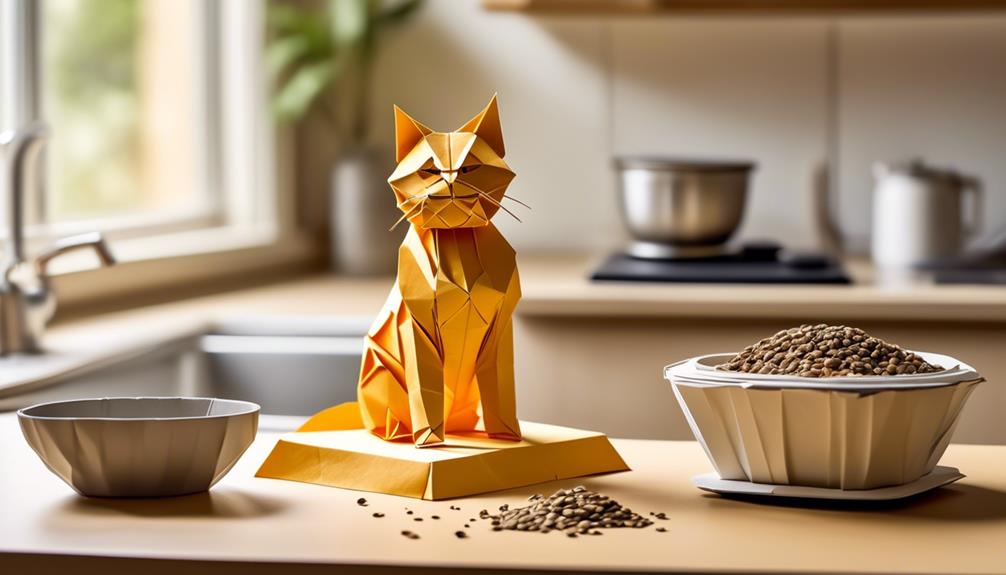As your cat ages, it’s important to monitor their diet carefully to prevent weight gain.
It’s a delicate balance, offering enough food to nourish without overfeeding. You’re about to learn three essential strategies to ensure that your cat is getting just the right amount of food. These techniques will not only help manage their weight as they age gracefully but also contribute to their overall health and vitality.
Stay tuned to uncover how to apply these practices in a way that suits both you and your beloved pet’s lifestyle.
Key Takeaways
- Tailor the diet to meet the evolving nutritional needs of senior cats.
- Consult with a vet to receive personalized advice and tailored recommendations.
- Monitor the cat’s weight regularly and adjust food portions accordingly to prevent weight gain or loss.
- Provide love, care, and attention along with proper nutrition to help the cat thrive in their senior years.
Assessing Senior Cat Needs
As your cat enters its senior years, it’s crucial to tailor their diet to their evolving nutritional needs with careful assessment and consideration. The journey of feeding senior cats is a delicate one, where love intertwines with the science of nutrition.
Assess the individual needs of senior cats, considering each cat’s unique health and vitality.
Decreased appetite or weight loss in your senior cat may signal the need for dietary adjustments. Portion control becomes paramount, ensuring that your cat receives enough calories per meal without overfeeding. It’s not just about the amount of food, but also the quality of the nutritional requirements that support their ageing bodies.
When you’re feeding senior cats, consider the timing and frequency of feeding times. Smaller, more frequent meals can aid digestion and maintain consistent energy levels. Be attentive and responsive to their cues; your cat’s behavior will guide you in fine-tuning their diet.
Planning Balanced Meals
When planning meals for your aging cat, it’s essential to tailor them to their specific health needs, ensuring each dish provides high-quality protein, controlled fats, and the right balance of vitamins and minerals. Selecting senior cat foods designed for their stage in life can make a significant difference in maintaining their health and vitality.
Feeding your senior cat isn’t just about the right nutrition; it’s about love and care. A balanced diet supports their aging joints and bolsters the immune system, which is critical as they become more susceptible to illness. You’ll want to focus on quality protein that’s easily digestible, minimizing strain on their metabolic processes.
The amount of food your cat needs may decrease as they grow older. Keep an eye on their weight and adjust portions to avoid overfeeding. Obesity in older cats can lead to a host of health issues, so it’s vital to strike the perfect balance.
Consult your vet to receive tailored advice for your cat’s diet. They can provide personalized recommendations that take into account your cat’s unique health profile. With their guidance, you can ensure that you’re nurturing your senior cat with the precise nutrition they require.
Monitoring Weight Regularly
While carefully planning your senior cat’s diet is a cornerstone of their health, keeping track of their weight through regular monitoring is just as crucial in catching any early signs of health issues. Senior cats often experience changes in their activity levels and metabolism as they enter their senior years, which makes monitoring weight regularly essential to help your cat maintain a healthy lifestyle.
By keeping a close watch on your furry companion‘s weight, you’ll be able to adjust the quantities of food you provide to prevent weight gain or loss. It’s also helpful to remember to serve their food at room temperature, as it’s more appealing and easier for them to digest.
Make it a routine to weigh your cat using a consistent method, such as a pet scale, and record their weight to track any trends. If you notice a significant change, don’t hesitate to consult with your veterinarian. Regular health check-ups are important to ensure that any weight changes aren’t indicative of underlying health problems.
Help your cat thrive in their senior years by being attentive to how much food they consume and by being vigilant about their weight. Your loving care can make a significant difference in their well-being.
Frequently Asked Questions
How Much Should You Feed an Elderly Cat?
You’ll want to feed your elderly cat smaller, more frequent meals to manage their weight and health. Always check with your vet to tailor their diet to their specific needs.
What Should Senior Cats Avoid in Food?
Nearly 81% of senior cats suffer from chronic kidney disease, so you should avoid giving them food high in phosphorus to protect their delicate health and ensure their comfort in later years.
What Nutrition Does a Senior Cat Need?
Your senior cat needs a diet rich in high-quality protein, with controlled fat and digestible carbs to support their joints and immune system. Remember to consult your vet for tailored nutritional advice.
How Do You Portion Control Cat Food?
You’ll want to measure your cat’s food carefully, split it into small meals throughout the day, and adjust as needed to keep them healthy. Using puzzle feeders also helps control their food intake.




